Economy in strong stead for more gains
Former Deputy Minister of Foreign Affairs Pham Quang Vinh said that since national reunification and after 50 years of ups and downs, Vietnam has achieved much, and created a foundation for strong development.
“After five decades, Vietnam has become a country with a high position in the international arena. It is not only self-sufficient in food and foodstuffs but is also one of the leading exporters in many fields such as coffee and electronic components, and participating in global supply chains and high-quality supply chains,” Vinh said. “Vietnam is a symbol of innovation, integration, and positive contribution to peace, stability, and development.”
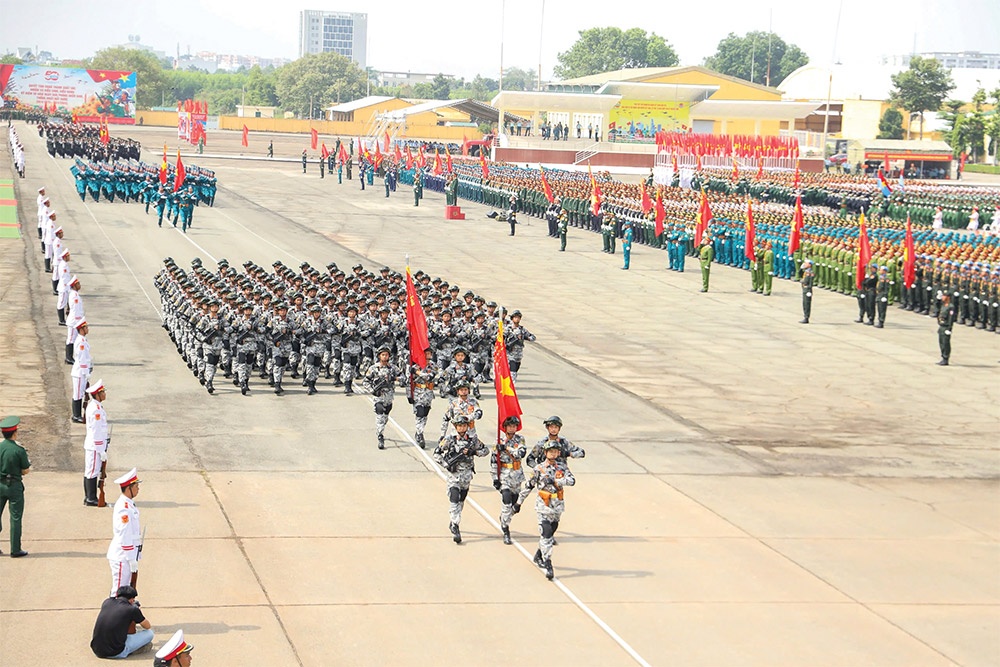 |
A pivotal turning point came in 1986, when the sixth National Party Congress launched the country on a path of economic reform and development. Vietnam gradually shifted from a centrally planned economy to a socialist-oriented market economy, with reforms extending beyond the economic sphere.
Now a middle-income country, Vietnam has set ambitious growth targets, aiming for 8 per cent GDP growth this year and double-digit annual growth over the following five years. The 13th National Party Congress set a bold objective for the country to become a high-income developed one by 2045.
Under the current leadership of Party General Secretary To Lam, the country is preparing for the 14th National Party Congress, with lessons learned from the past to chart a clear path forward, which will be essential in opening Vietnam’s new era of national rise.
Currently Vietnam has a large network of 17 free trade agreements and is negotiating more with Israel, the UAE, and with the European Free Trade Association, comprised of Switzerland, Norway, Iceland, and Liechtenstein.
Expanding its free trade network underscores Vietnam’s commitment to economic integration, offering substantial opportunities to deepen its role in global value chains, boost exports, drive GDP growth, and enhance institutional frameworks.
In pursuit of an export-oriented economy, Vietnam has so far made a success in development, with the country expecting a higher growth rate this year. The country’s strides have received applause from international high-profile organisations, some of which have offered positive projections.
At the 55th annual meeting of the World Economic Forum (WEF) in Switzerland earlier this year, Rebeca Grynspan, Secretary-General of the UN Conference on Trade and Development, expressed admiration for Vietnam’s economic growth over the past 30 years, highlighting Vietnam’s economic achievements, regional integration, and enhanced diplomatic standing.
“Vietnam has become a model for reshaping the future of global trade and development,” Grynspan said. “It represents not just a development success story, but a testament to how trade and development can work together.”
The International Monetary Fund forecasts that the size of Vietnam’s economy will reach $506 billion in 2025, ranking 33rd globally. According to the World Bank, Vietnam’s GDP growth will be 6.8 per cent in 2025 and 6.5 per cent in 2026, making Vietnam one of the fastest growing economies in the East Asia-Pacific region.
Meanwhile, Standard Chartered Bank forecasts Vietnam’s GDP growth to reach 6.7 per cent this year, with an on-year increase of 7.5 and 6.1 per cent, respectively, in the first and second half of the year.
“Vietnam’s economy is set to continue growing strongly, but risks such as global demand slowdowns, inflation, and external trade dependencies remain. If the country successfully navigates these challenges while boosting innovation and upgrading its workforce skills, it has the potential to become a leading industrial economy in Asia,” said global analysts FocusEconomics. “Its ability to balance economic liberalisation with state intervention will shape its long-term success.”
Giovanni Sbattella, an economist from FocusEconomics, said the government’s newly proposed economic plan is ambitious.
“We are currently forecasting growth of below 7 per cent this year, with growth gradually decelerating towards 6 per cent through 2029. While large-scale infrastructure projects are set to fuel the construction sector and exports will be boosted by strong global IT demand, US tariffs cast a shadow over the external sector and foreign investment flows.”
While the country’s GDP last year growing nearly 7.1 per cent with a scale of $476.3 billion, its export-import turnover reached nearly $786.3 billion, up 15.4 per cent on-year, with a total trade surplus of $24.77 billion.
In February, the government also issued a resolution on growth goals for sectors and localities in an aim to hit an economic growth rate of 8 per cent upward. Each province and city is required to achieve regional GDP of at least 8 per cent. Localities such as Bac Giang, Haiphong, and Quang Ninh must grow at a double-digit rate, and Hanoi and Ho Chi Minh City are tasked to grow 8 and 8.5 per cent, respectively.
The unprecedented resolution also asked chairs of people’s committees of all localities to “expeditiously design growth scenarios of sectors on a monthly and quarterly basis, and scenarios on regional GDP growth” in service of the government’s economic management.
Notably, in addition to mandatorily implementing tasks assigned by the government, localities are allowed to propose specific policies to the government to remove difficulties and encourage advantages and resources.
The government also said it will continue focusing on cutting down and simplifying administrative procedures and business regulations in a practical and effective manner.
Alex Crane, managing director, Knight Frank
 |
Living in Vietnam since 2011 has been a wild, rewarding ride. What started as a short stay turned into over a decade of calling Ho Chi Minh City home. I've watched the cities grow, the coffee culture explode, and the traffic somehow get both worse and better at the same time. But more than anything, it’s the people, the food, and the everyday energy of life here that has kept me rooted.
With Reunification Day, it’s always a great reminder of how far the country has come. As a resident of downtown Ho Chi Minh City, the build up to this huge celebration has been infectious and mirrors the spirit of the country; pride, fun, a touch of chaos, but wholesome in the sense that this is a view to the future as much as the past which is an amazing trait of the Vietnamese people.
It is always an honour to me when locals joke that ‘you are Vietnamese now’. Well, for this week, I really look forward to the Vietnamese being a bit more like us British with this huge celebration a bit like we have in London. If anything, I think Vietnam could do more of this, bunting and banh mi. It is so unique to experience this here in Ho Chi Minh City, and it is a genuine honour and a privilege to be here and be part of it. I’m feeling very proud to call this country my home.
Greg Ohan, co-founder and CEO, The Sentry
 |
My first encounter with Vietnam in 2010 sparked an immediate affection for the gentle rhythm of its cities and the warmth of its people. The energy, the welcoming smiles, and the vibrant culture painted a captivating picture, making it an attractive place to settle and build a life, business, and family amid a burgeoning economy and diverse opportunities.
As Vietnam proudly commemorates the 50th anniversary of its reunification on April 30, my admiration deepens. The victory of 1975 stands as a monumental testament to the unwavering resilience and indomitable spirit of the Vietnamese people in their long and arduous struggle for national independence. Against immense odds, their courage shone through, securing their sovereignty and preserving their unique identity, fulfilling the cherished wish of President Ho Chi Minh: "Vietnam is one, the Vietnamese people are one."
It is with heartfelt congratulations that I join in celebrating this historic milestone. Beyond the echoes of the past, Vietnam’s remarkable socioeconomic progress and its growing stature on the global stage are truly commendable. The nation’s ability to blend tradition with modernity creates a dynamic and exciting environment for all. Happy 50th anniversary of reunification, Vietnam!
Yaron Mayer, Israeli Ambassador to Vietnam
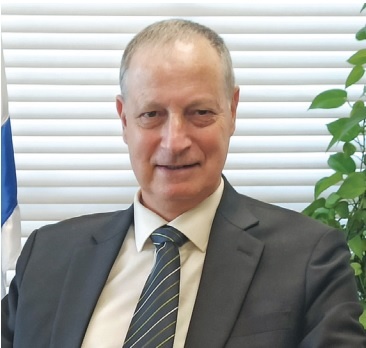 |
Vietnam entered 2025 amid ongoing global challenges, yet impressively, the country continues to maintain its stability, prosperity, and deftness in foreign policy.
In recent times, leaders of major powers visited and held talks with Vietnamese leaders. These high-level engagements reflect international respect for Vietnam, as well as its success in managing relations with global powers.
As an active member of ASEAN, Vietnam continues to serve as a bridge for peace, cooperation, and development in the region. Vietnam also strengthens its role in multilateral forums such as the United Nations, APEC, the World Trade Organization, and others.
On the economic front, Vietnam continues to impress with stable growth. Many critical infrastructure projects have been approved, most notably the $8 billion railway connecting Lao Cai to Haiphong - a major step towards regional connectivity and trade facilitation.
But Vietnam isn’t stopping at physical infrastructure. The country is also making great strides in technological innovation, implement satellite internet, digital transformation, in a nod to its long-term vision and commitment to modernisation.
Perhaps what moves me the most is Vietnam’s effort to ensure inclusive growth. We welcome the highly appreciated decision to grant free tuition for pupils nationally, as education is becoming more and more affordable.
This year is also a meaningful occasion for us, Israel’s friends, to reflect on 32 years of diplomatic ties with Vietnam. Since Israel opened its embassy in Hanoi in 1993, the two nations have built a relationship grounded not only in shared interests, but also in deep mutual trust and people-to-people friendship.
Two presidents of Israel visited Vietnam and a major highlight is the signing of the Vietnam-Israel Free Trade Agreement, which came into effect in 2024. This is more than a trade deal - it is a strategic bridge ushering in a new chapter of bilateral cooperation, expected to boost two-way trade and expand into sectors such as smart agriculture, cybersecurity, healthcare, and more.
We take pride in seeing Israeli tech applied across rural Vietnam, helping to improve productivity. Conversely, Vietnamese students in Israel are acquiring knowledge through schemes run by Israel’s international development agency, and bringing it back home.
Our people-to-people friendship has never been this solid, as seen by the ever-growing numbers of Israeli tourists to Vietnam every year, up to 47 per cent from the previous year.
I believe Vietnam will not only become a regional powerhouse, but also a responsible leader on the global stage. With its long-term vision, resilient people, and openness to innovation, Vietnam is charting an inspiring path of development.
Marco Della Seta, Italian Ambassador to Vietnam
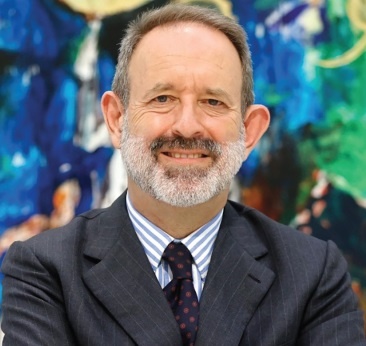 |
Vietnam has achieved extraordinary economic growth over the last three decades, built on the resilience and industriousness of its people and a clear strategy of its leaders. Such achievements in terms of growth are accompanied by an equally remarkable diplomatic activity.
Such activism is being reinforced in 2025, with Hanoi hosting several high-level international summits, among which the UN Cybercrime convention stands out as a landmark achievement for Vietnam’s diplomacy.
Vietnam has renewed its commitments to multilateralism: it is an active member of ASEAN, supporting dialogue on Indo-Pacific security and prosperity, and it reaffirmed its support for the UN Charter and the principles of international law. The ASEAN Future Forum, held in Hanoi earlier this year, reinforced Vietnam’s image as a responsible, proactive, and reliable partner in the global arena.
Throughout the decades, Italy has been supporting Vietnam’s development and commended its efforts to pursue inclusive and sustainable growth. Italy was among the first Western European countries to establish diplomatic relations with Vietnam in 1973, three years before its reunification, marking the beginning of positive and fruitful dialogue between the two countries. This special relationship culminated with the signing of a strategic partnership agreement in 2013, which consolidated bilateral ties and opened for additional opportunities for cooperation.
In recent years, the Italy-Vietnam partnership has expanded across key sectors such as renewable energy, infrastructure, manufacturing, food processing, higher education, aerospace, and heritage conservation. Several Italian companies are seeking partnership opportunities in Vietnam and are willing to transfer knowledge and technical expertise to their Vietnamese counterparts. And in 2024 alone, 12 new greenfield Italian investments were carried out in Vietnam.
Helga Margarete Barth, German Ambassador to Vietnam
 |
Vietnam’s economic trajectory has truly been remarkable. Within only a few decades, the country has transitioned from one of the world’s poorest nations to an emerging economic powerhouse in Southeast Asia. Since the 1980s, Vietnam has globally grown to become an increasingly important trading partner, as well as for Germany.
Bilateral trade has expanded significantly, reaching more than $20 billion in 2024, with Germany remaining Vietnam’s largest European trading partners. The country has evolved into an important hub for German businesses in ASEAN, attracting investments in the more traditional fields such as manufacturing and chemicals, as well as in future-oriented sectors such as electronics, finance, and IT.
In 2025 and beyond, trade and investment cooperation between Germany and Vietnam holds immense promise. This partnership is not only vital for the economic growth of both nations but also serves as a strategic alliance in an increasingly complex geopolitical landscape. In an era of growing global uncertainties, Germany and the EU are reliable partners at Vietnam’s side.
This year, we are not only celebrating the 50th anniversary of Vietnam’s reunification but also 50 years of diplomatic relations between Vietnam and Germany. This jubilee is a testament to the two countries’ strategic partnership that has grown from early trade ties into a deep and dynamic collaboration in many fields.
It highlights not only Vietnam’s economic success but also the potential for growth in the bilateral relationship, providing opportunities for both nations in the years to come.
Germany stands ready to support Vietnam’s ongoing modernisation through investments, technology transfer and educational exchanges.
Denny Abdi, Indonesian Ambassador to Vietnam
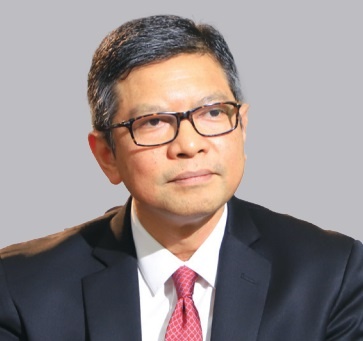 |
Since the reunification on April 30, 1975, Vietnam has undergone remarkable development. As we reflect on 50 years of progress, it is evident that the country’s transformation has been truly impressive. Catalysed by the launch of the economic reforms in the 1980s, Vietnam has transitioned into one of the fastest-growing economies in Southeast Asia powered by its increased economic integration into the world.
In 2024, Vietnam recorded a GDP growth of 7.09 per cent, driven by robust industrial production and a strong focus on research and innovation. This growth reflects Vietnam’s resilience in navigating to global economic challenges, as well as is adaptability in harnessing emerging technologies, such as electric vehicles and digital industries.
Amid this rapid development, cooperation between Indonesia and Vietnam has also grown significantly. Total bilateral trade reached $16.7 billion in 2024, double compared to the figure of $8.07 billion in 2020.
Our collaboration now spans a wide range of key sectors, including high-tech agriculture, fisheries, textiles, electrical equipment, spare parts, and vehicle components. With the elevation of our bilateral relationship to a strategic comprehensive partnership in March, the potential for deeper and more diversified economic cooperation is immense.
Fostering collaboration in the development of our young generations should be prioritised. The total number of students in Indonesia and Vietnam combined reaches approximately 87.6 million people, including 12.1 million university students.
The development of these young generations will be the foundation towards future cooperations, to unlock new opportunities such as in AI, green technology, digital economy, and sustainable development, which will be pivotal in shaping our future economic landscape, fostering enhanced trade, investment, and shared prosperity for both nations.
On the occasion of the 50th anniversary of Reunification Day, I believe this milestone offers strong momentum for Vietnam to continue its upward trajectory and to expand its partnerships globally. In this sense, Indonesia stands ready to further strengthen its cooperation with Vietnam across all sectors.
Olivier Brochet, French Ambassador to Vietnam
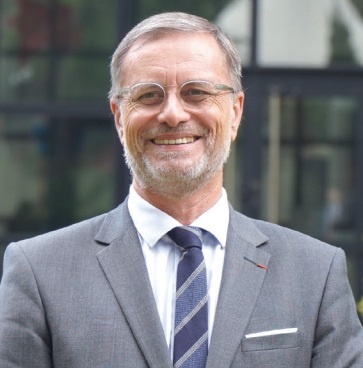 |
Over the past decades, Vietnam’s transformation has been truly remarkable. Since the doi moi reforms, the country has emerged as one of Asia’s most dynamic economies, combining openness to global markets with a clear development vision. France has been a long-standing and trusted partner in this journey.
As one of the first countries to support Vietnam’s reforms, France has mobilised over €3 billion ($3.4 billion) through the French Development Agency to finance infrastructure, sustainable development, and climate resilience projects such as railways, subways, and green energy capacities.
France has also been strongly committed to training and education, nurturing a generation of Vietnamese professionals and decision-makers. Here in Vietnam, training institutions such as the University of Science and Technology of Hanoi (also called Vietnam-France University) and the French Vietnamese Centre of Management, are working in training the next generation of Vietnamese executive that will be instrumental in ushering the country into a new era of development focused on innovation.
Today, close to 300 French businesses are present in Vietnam, making France the second-largest European investor. As Vietnam enters a new phase, one focused on both accelerating and enriching its growth, France and its companies are ready to strengthen their partnership within the framework of the Global Strategic Partnership.
Our cooperation is particularly strong in sectors where France offers world-class expertise: nuclear energy, transportation (especially railways), healthcare, agriculture, and food innovation. These are all areas where Vietnam is developing new ambitions and where our collaboration can bring high value-added solutions.
The recent visit of Laurent Saint-Martin, French Minister Delegate for Foreign Trade and French Nationals Abroad, to Vietnam further illustrated our shared ambition to deepen the Global Strategic Partnership and to jointly shape a future built on innovation, sustainability, and mutual prosperity.
Beyond figures, our relationship is built on trust, mutual respect, and a shared belief in sustainable, inclusive growth. France looks forward to working even more closely with Vietnam to support its ambitions and contribute to its continued success.
Iain Frew, British Ambassador to Vietnam
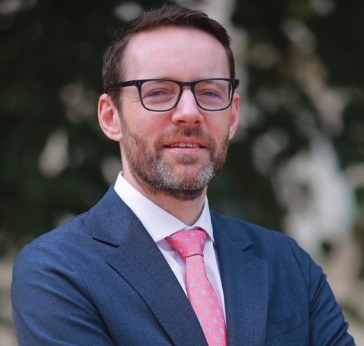 |
Vietnam’s remarkable economic transformation over the past decades has positioned it as one of the most dynamic and open economies in the region. With a strong focus on trade liberalisation, innovation, and sustainability, Vietnam has lifted millions out of poverty, with GDP per capita reaching $4,323 – an increase of 58 times over the past three decades. This progress has made Vietnam an increasingly attractive partner for global trade and investment.
The UK is proud to be part of this journey. Bilateral trade between the two countries has doubled over the last decade, reaching approximately £7.1 billion in 2024. The UK-Vietnam Free Trade Agreement which came into force in 2021, has played a key role in supporting Vietnam’s export-oriented industries – from coffee and seafood to textiles – helping them gain greater access to the UK market.
At the same time, the agreement has created a more favourable environment for British businesses to invest in Vietnam, encouraging technology transfer, innovation, and knowledge sharing.
The UK’s accession to the Comprehensive and Progressive Agreement for Trans-Pacific Partnership opens a new chapter in our economic relationship. It offers expanded access to new markets, deepens our trade links, and creates further opportunities for both UK and Vietnamese enterprises to grow and collaborate in a rules-based, forward-looking trade environment.
As Vietnam is now entering a new era of growth, the UK is committed to supporting a strong, transparent, and sustainable trade and investment partnership with Vietnam, making the most of these agreements. We are now developing initiatives together in the key industries of the future, for example in the development of international financial centres in Ho Chi Minh City and Danang, in tech and AI, as well as education and healthcare innovation.
Sandeep Arya, Indian Ambassador to Vietnam
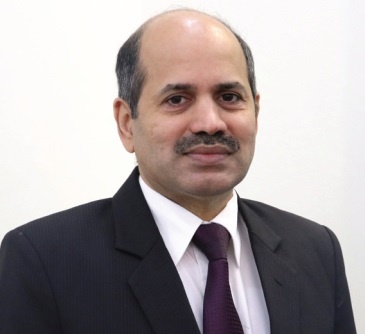 |
Both countries have set high targets: India aims to be a developed country by 2047, while Vietnam aspires to become a high-income, developed country by 2045. These goals are backed by determined governments, dynamic entrepreneurs, and striving citizens in both nations. These national trends are attracting growing attention from authorities and businesses in India and Vietnam, leading to vibrant efforts to capitalise on opportunities and synergies between them.
Economic growth and development in both nations are driven by strong infrastructure building, expanding power generation and distribution projects, greater use of renewable energy, forward-looking industrialisation, foreign trade, digital application, innovation, emerging technologies such as 5G and AI, and supportive human resources. These domains also guide efforts to strengthen economic relations between both sides.
The bilateral trade of about $15 billion per year has further prospects for growth in terms of Indian exports in areas like engineering goods, pharmaceuticals, agricultural goods, garments and textiles, ICT, jewellery and more. Vietnamese trade experts will know better, but data suggests that Vietnam’s growing exports to India are competitive and could grow in areas such as mobile phones and accessories, electronic items and spare parts, and other industrial goods.
What the stars mean:
★ Poor ★ ★ Promising ★★★ Good ★★★★ Very good ★★★★★ Exceptional
Related Contents
Latest News
More News
- State corporations poised to drive 2026 growth (February 03, 2026 | 13:58)
- Why high-tech talent will define Vietnam’s growth (February 02, 2026 | 10:47)
- FMCG resilience amid varying storms (February 02, 2026 | 10:00)
- Customs reforms strengthen business confidence, support trade growth (February 01, 2026 | 08:20)
- Vietnam and US to launch sixth trade negotiation round (January 30, 2026 | 15:19)
- Digital publishing emerges as key growth driver in Vietnam (January 30, 2026 | 10:59)
- EVN signs key contract for Tri An hydropower expansion (January 30, 2026 | 10:57)
- Vietnam to lead trade growth in ASEAN (January 29, 2026 | 15:08)
- Carlsberg Vietnam delivers Lunar New Year support in central region (January 28, 2026 | 17:19)
- TikTok penalised $35,000 in Vietnam for consumer protection violations (January 28, 2026 | 17:15)

 Tag:
Tag:


















 Mobile Version
Mobile Version